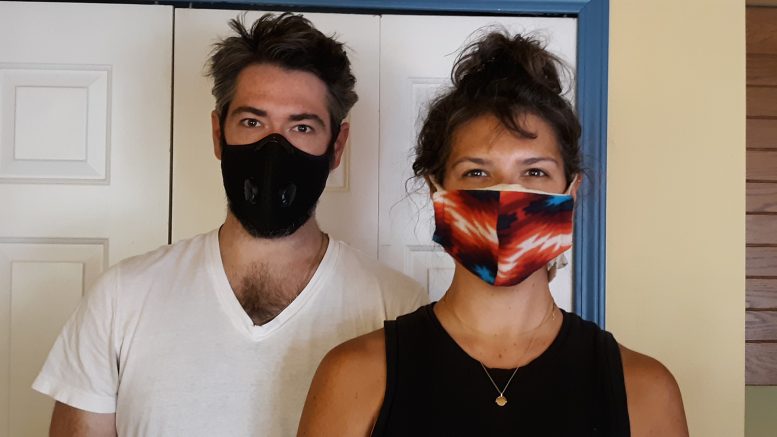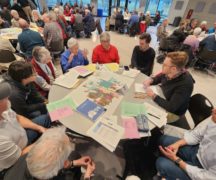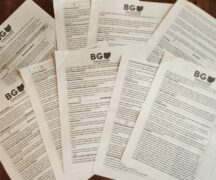By JAN LARSON McLAUGHLIN
BG Independent News
City leaders are looking at making masks mandatory in Bowling Green.
As the number of COVID cases tick upward at a faster pace, and other states are adopting mask requirements, Ohio Gov. Mike DeWine has been reluctant to take that safety measure.
So instead, some municipalities are doing it on their own. In the last two days, Dayton and Columbus have made masks mandatory. And Bowling Green City Council and Mayor Mike Aspacher are considering doing the same.
“In an ideal world, we would see leadership from a higher level,” such as from the state or national leaders, Bowling Green City Council President Mark Hollenbaugh said Thursday morning. “We were hoping Gov. DeWine would show some leadership.”
While Hollenbaugh praised DeWine’s early actions to stem the growth of COVID cases in Ohio, he has been less impressed with the lack of action recently.
“He’s really dropped the ball in the later months,” Hollenbaugh said.
The topic of mandated masks also came up Thursday afternoon during a virtual meeting of Not In Our Town BG.
“As an older and somewhat vulnerable person, I am hearing concern and anger around the community for the cavalier way some members of the community are blowing off masks and social distancing,” retired Rev. Gary Saunders said.
Wearing masks has been proven to be a vital component to reducing the spread of coronavirus. So the unwillingness of local residents to take the simple step of wearing a mask is disturbing to many, Saunders said.
“I’m not really sure that’s Bowling Green at our best,” he said. “What’s the moral backbone of our community?”
Earlier on Thursday, Mayor Mike Aspacher shared similar concerns.
“It does not appear a significant amount of people are wearing masks” in Bowling Green, Aspacher said. But meanwhile the number of cases in Wood County are growing by double digits on most days.
“I’m certainly concerned,” the mayor said.
Aspacher noticed that DeWine praised the fortitude of Dayton for mandating masks on Wednesday. But the mayor questioned why the governor didn’t require masks for the entire state.
“If he felt that way, why didn’t he implement it on a state basis,” the mayor said. DeWine had issued a mandatory mask rule a couple months ago, but backpedaled when Republican leaders and business officials objected.
Aspacher said he consulted with City Attorney Mike Marsh, who advised that Bowling Green’s charter does not give the mayor the power to enact a mask requirement. So it would take a city ordinance to make masks mandatory.
On Thursday afternoon, Aspacher and Hollenbaugh met to discuss the subject. Hollenbaugh asked Marsh to start drafting legislation, and asked the mayor to talk with the police chief about enforcement of a mask mandate.
“If the governor doesn’t do his job we’ll do it for him,” Hollenbaugh wrote in an email.
Enforcement could be tricky.
“We don’t want our police arresting 80-year-old grandmas who aren’t wearing masks,” Hollenbaugh said.
Hollenbaugh predicted the language of the ordinance would be similar to the standards suggested by the CDC. Masks would be required inside buildings, and outside in situations where 6 feet of social distancing can’t be maintained.
Bowling Green officials plan to look at Dayton’s requirements – which includes an $85 fine for people violating the rule – and see what might work for this city.
Hollenbaugh acknowledged that Bowling Green’s coronavirus numbers aren’t seeing the spike that is being experienced in the Dayton and Cincinnati areas.
“But if things continue to deteriorate,” it’s often too late to slow the spread, Hollenbaugh said.
Council member Neocles Leontis said a statewide mask mandate would work best.
“If we do it in this little town,” and no one else does in the county, the positive impact is limited, he said. “We definitely would prefer if the state would take action.”
Hollenbaugh agreed.
“We’re still hopeful that the governor will issue a statewide order,” he said.
Hollenbaugh has concerns that locally adopted ordinances may be overruled by the state. He pointed out city council’s past attempts to ban firearms in city parks, and ban single-use plastic bags, as efforts that went nowhere because the state usurped grassroots control.
At the Not In Our Town meeting, people discussed the need for coordinated efforts between the city and Bowling Green State University. If there is not a united message, the result could be an “unleashing in the city of all students” with no plan in place, BGSU professor Steve Demuth said.
Not In Our Town co-chairs Dawn Shinew and Emily Dunipace agreed.
It would be in the best interest of both entities to have one approach, Shinew said.
“There needs to be somebody maintaining best practices,” Dunipace said. “You wear a mask because you care about other people.”
Council member Bill Herald assured those at the Not In Our Town meeting that though some council members attend meetings in person, they all wear masks. He also said council is looking closely at Dayton’s action on face coverings.
“We are studying it and taking it very seriously,” Herald said.





